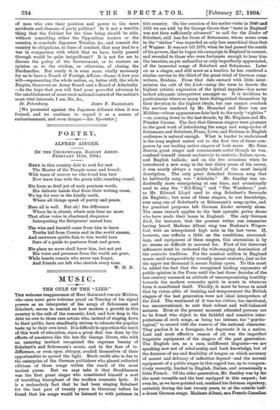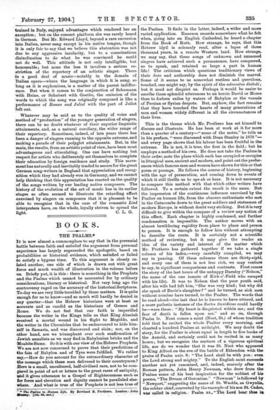THE CULT OF THE "LIED."
TER welcome reappearance of Herr Raimund von zur Miihlen, who once more gave welcome proof on Tuesday of his signal powers as an interpreter of the songs of Schumann and Schubert, serves to remind us how modern a growth in this country is the cult of the romantic Lied, and how deep is the debt we owe to those rare artists who, instead of singing down to their public, have steadfastly striven to educate the popular taste up to their own level. It is difficult to apportion the merit of this work of education, since a great deal was done by the efforts of amateurs like the late Sir George Grove, who with an unerring instinct recognised the supreme beauty of Schubert's and Schumann's music, and in the face of in- difference, or even open obloquy, availed themselves of their opportunities to spread the light. Much credit also is due to the enterprise of the German publishers who placed collected editions of these songs within the reach of the most modest purse. But we may take it that Stockhausen was the first great singer who constituted himself a sort of travelling hierophant of the modern romantic lyric. It is a melancholy fact that he had been singing Schubert for the best part of twenty years in Germany before he found that his songs would be listened to with patience in this country. On the occasion of his earlier visits in 1849 and 1851 we are told by Sir George Grove that "taste in England was not then sufficiently advanced" to call for the Lieder of Schubert, still less for those of Schumann, whose music even in the "sixties "was regarded as only less anarchical than that of Wagner. It was not till 1870, when he had passed the zenith of his powers, that he began his campaign in England in earnest, and revealed to those who were fortunate enough to hear him the beauties, as yet unfamiliar or only imperfectly appreciated,. of the immortal songs of Schubert and Schumann. Later on as a singer, and still more as a teacher, he has rendered a similar service to the third of the great triad of German song- writers, Brahma. From that date onward with little inter- mission the cult of the Lied—using the term to denote the highest artistic expression of the lyrical impulse—has never lacked adequate interpreters amongst us. It is invidious to. particularise where so many have distinguished themselves by their devotion to the highest ideals, but one cannot overlook the services rendered by Mr. Henschel and Herr von mu- Miihlen—whose appearances date back to the early " eighties " —or, coming down to the last decade, by Mr. Bispham and Mr.. Plunket Greene. The fact that German singers were pioneers in the good work of introducing the songs and song-cycles of Schnranym and Schubert, Franz, Lowe, and Brahma, to English audiences is natural enough. What is harder to understand is the long neglect meted out to the first tivo of these com- posers by our leading native singers of both sexes. Mr. Sims Reeves, great singer and consummate artist though he was,. confined himself almost exclusively to oratorio, Italian opera, and English ballads; and on the few occasions when he introduced a new song in the last thirty years of his career,. it was nearly always a royalty ballad of the most insipid. description. The only great detached German song that he habitually sang was " Adelaida." Mr. Santley was un- doubtedly more enterprising at one time, and occasionally used to sing the " EA-King " and "The Wanderer," jud- os Mr. Edward Lloyd used to sing Schubert's Serenade (in English) ; but none of these singers, to our knowledge,. ever sang one of Schubert's or Schumann's song-cycles, and. for practical purposes left German ideder severely alone. The same remark applies to the best operatic prime donne who have made their home in England. The only German Lied, for instance, that the present writer can remember having heard Madame Alloani sing was Brahms's Wiegen- lied, with an interpolated high note in the last verse. If, however, one reflects a little on the conditions, surround- ings, and equipment of these singers, this abstention is by no means so difficult to account for. First of the deterrent influences must be reckoned the wide-ranging domination of the oratorio tradition. For the musical million in England music until comparatively recently meant oratorio, just as for the upper ten thousand it meant Italian opera. To this must be added the fact that the recognised leading exponents of public opinion in the Press until the last three decades of the last century assumed an attitude of uncompromising hostility towards the modern romantic spirit in music in whatever form it manifested itself. Thirdly, it must be borne in mind. that by virtue alike of training and temperament the British singers of the last generation were not ideal interpreters of the Lied. The sentiment of it was too intime, too emotional,. too unconventional, to suit their robust and well-balanced natures. Even at the present moment educated persons are to be found who object to the faithful and sensitive inter- pretations of such songs, as being too intense, too "psycho- logical," to accord with the reserve of the national character.. They pardon it in a foreigner, but deprecate it in a native. Last and most effective reason of all was the imperfect. linguistic equipment of the singers of the past generation. The English are, as a race, indifferent linguists—we are speaking now not of scholarship and book knowledge, but of the fineness of ear and flexibility of tongue on which accuracy- of accent and delicacy of inflection depend—and the normal equipment of a public singer in this regard was, up to compara- tively recently, limited to English, Italian, and occasionally a little French. Of the elder generation, Mr. Santley was by far the most versatile and the best equipped in this respect; but even he, as we have pointed out, confined his German repertory, certainly during the last twenty years, to at the outside half- a-dozen German songs. Madame Albani, as a French-Canadian trained in Italy, enjoyed advantages which rendered her an exception; but on the concert platform she was rarely heard in German. But Mr. Edward Lloyd, beyond a rare excursion into Italian, never sang except in his native tongue, though it is only fair to say that we believe this abstention was not due to any aggressive insularity, but to a conscientious disinclination to do what be was convinced he could not do well. This attitude is not only intelligible, but honourable; but none the less it involves a serious re- striction of the repertory of an artistic singer. There is a good deal of music—notably in the domain of Italian opera—where the language in which it is sung, so long as it is euphonious, is a matter of the purest indiffer- ence. But when it comes to the conjunction of Schumann with Heine, or Schubert with Goethe, the omission of the words to which the song was originally composed is like a performance of Borneo and Juliet with the part of Juliet lleft out.
Whatever may be said as to the quality of voice and method of "production" of the younger generation of singers, there can be no doubt whatever of their superior linguistic attainments, and, as a natural corollary, the wider range of their repertory. Sometimes, indeed, of late years there has been a danger of singers running to the opposite extreme, and making a parade of their polyglot attainments. But, in the main, the results, from an artistic point of view, have been most advantageous and stimulating. One can have nothing but respect for artists who deliberately set themselves to complete their education by foreign residence and study. This move- ment has naturally and inevitably tended to secure for the great German song-writers in England that appreciation and recog- nition which they had already won in Germany, and we cannot help thinking that this appreciation has reacted on the quality of the songs written by our leading native composers. The history of the evolution of the art of music has in its earlier stages so often seemed to illustrate the retarding effect exercised by singers on composers that it is pleasant to be able to recognise that in the case of the romantic Lied interpreters have, on the whole, loyally striven to spread the
light. C. L. G.











































 Previous page
Previous page